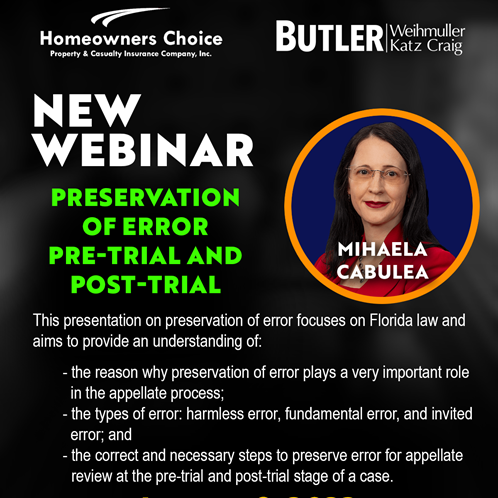
Timing is Everything: Changes to Florida’s ‘Proposal for Settlement’ Rule Inapplicable to Proposals Made Before the Rule Changes Became Effective
Overview | Blog Posts, News | Appellate | William (Bill) Lewis, Vincent Fernandez | Related | Print | Share
September 11, 2025
Proposals for settlement are a litigation tool highly favored by Florida courts to resolve cases. |
They are governed by section 768.79, Florida Statutes, and Florida Rule of Civil Procedure 1.442. Strict compliance with the governing statute and rule is key to the enforcement of a proposal. A party that rejects a valid proposal could be required to pay the opposing party’s attorneys’ fees as a sanction for rejecting the proposal. |
Recently, the Second District Court of Appeal held that two substantially identical proposals for settlement served and rejected before a change to Florida Rule of Civil Procedure 1.442 were valid because compliance is measured by the rule in effect when the proposal is served, not when it is sought to be enforced (sometimes years) later. Stevens v. Florida Peninsula Ins. Co., No. 2D2024-0253, 2025 WL 2486325, *1 (Fla. 2d DCA Aug. 29, 2025).
In Stevens, the insurer in the litigation of a property insurance claim served both insureds with substantively identical proposals that each contained a general release of the claim. Id. The insureds did not raise with the insurer/offeror any objections or ambiguities or seek any clarifications with respect to either proposal. Id. at *2. Neither insured responded to the proposal within the timeframe for accepting, resulting in the rejection of each proposal. Id.
The insurer later prevailed in the litigation and timely sought to enforce its proposals. Id. at *1. But before the insurer sought to enforce its proposals, the Florida Supreme Court amended Florida Rule of Civil Procedure 1.442 to require that a proposal for settlement “exclude nonmonetary terms, with the exceptions of a voluntary dismissal of all claims with prejudice and any other nonmonetary terms permitted by statute.” Id. Among other ambiguity arguments, the Stevens insureds argued that this rule change, made after the proposals, invalidated the proposals made before the change because of the general releases attached to them. Id.
In affirming the trial court’s ruling rejecting the insureds’ arguments, the Stevens court held the rule amendment was not applicable to the proposals because they had already been served and rejected before the amendment took effect. Id.
While the proposals were made and expired/rejected before the amendment, the Stevens court also suggests that a proposal made before the amendment that expired after the amendment took effect would similarly not be subject to the requirements of the amendment. Id. (“[T]he proposals at issue here are valid and enforceable because they satisfied the law in effect at the time they were made.”).
In a special concurrence, Judge Moe expressed concerns with the insureds only raising ambiguity issues regarding the proposals years after receiving and rejecting them. Id. at **6-7. Relying on the court’s precedent in Diecidue v. Lewis, 223 So. 3d 1015 (Fla. 2d DCA 2017), Judge Moe reasoned that the insureds should have timely raised their ambiguity arguments, instead of waiting long after the period expired and were rejected. Stevens, 2025 WL 2486325 at **6-7. If the proposals were objected to, the insurer could have served new proposals to address the insureds’ perceived ambiguities. Id. But, because the insureds did not raise any ambiguities, Judge Moe reasoned that they waived them. Id.
The majority in Stevens, however, declined to adopt Judge Moe’s reasoning, commenting that using Judge Moe’s waiver analysis would “inject[] a new pitfall in the process that sets up the troubling result in which a court is required to enforce an offer that was never legally valid.” Id. at *2. After all, it is the offeror of a proposal, not the offeree, who bears the burden of strictly complying with the proposal statute and rule.
Courts routinely reject post-loss gamesmanship and nitpicking with respect to proposals for settlement, in line with an overall public policy that encourages resolution of disputes. The court’s opinion in Stevens sets out that parties, in making proposals, are not required to foresee future changes to the statutory and rule-based requirements of a proposal and comply with these yet-to-be-enacted requirements.
For any additional inquiries, please contact Bill Lewis or Vincent Fernandez.



